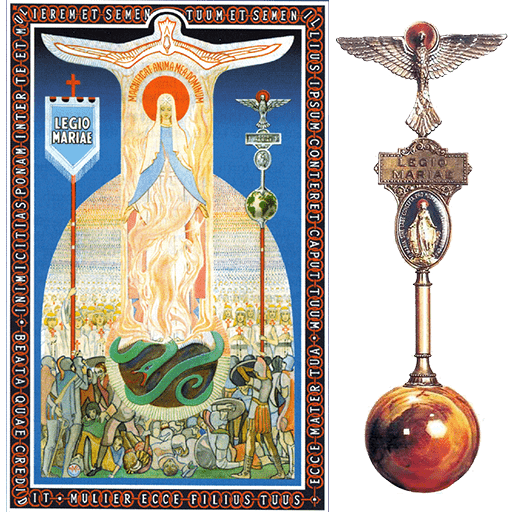The Eucharistic Congress and the Legion (3)
Concilium Allocutio March 2012
By Fr. Bede McGregor O.P.
Spiritual Director to the Legion of Mary
The Eucharistic Congress and the Legion (3)
The Liturgy of the Word
Last month we highlighted the simple truth that the bottom line of every Eucharistic Congress and indeed the central point of the abundant richness of the teaching of the Magisterium on the Eucharist is the real presence of the Crucified and Risen Lord among us. Jesus abides in the Church, his mystical Body. He is absolutely inseparable from the Church. You cannot be in union with Jesus without being in union with his Body the Church. The real presence of Christ in the Eucharist is the life of the Church and the source and dynamism of its mission and the total work of evangelisation. The promise of Our Lord: ‘I will be with you always’ is verified most concretely in the Eucharist. He is totally and always present to us, Body, Blood, Soul and Divinity. He is completely at our service as is clear in St. John’s reflection on the meaning of the Eucharist. At the last supper we have the extraordinary picture of God washing the feet of the disciples. The infinite humility of God is given to us as an example of how we must engage in the mission of the Church and every form of apostolate.
All these thoughts and many more will be found in the different sections of the Handbook dealing with the Eucharist. Last month we dwelt on section one of chapter 8 on the Sacrifice of the Mass. We stressed the defined teaching of the Church on the identity of Mass with the Sacrifice of Calvary. We underlined the infinite value of the Mass as explained in the Handbook. Today I want to reflect on section 2 of chapter 8 concerning the Liturgy of the Word. The Handbook begins by quoting the General Instruction on the Missal: ‘when the Scriptures are read in church, God Himself is speaking to his people, and Christ, present in his word, is proclaiming the Gospel. Hence the readings from God’s word are among the most important elements in the liturgy and all who are present should listen to them with reverence.’ The thrust of this statement is developed in the patristic conviction that Sacred Scripture is a sacrament of the Heart of Christ. St. Ignatius of Antioch (b. 50 AD) wrote: ‘I take refuge in the Gospel as in the flesh of Christ.’ Much later, St. John Eudes writes: ‘O heart of my Beloved I adore you as the source of all the words in this book.’
There is a quotation from St. Caesarius of Aries (b.470 AD) in one of the Congress Documents that gives us a profound insight into the real presence of Our Lord in Sacred Scripture. It goes as follows: ‘Tell me brothers and sisters what do you think is more important: the Word of God or the Body of Christ? If you want to respond well, you must without doubt say that the Word of God is not less than the Body of Christ. And therefore if we are so careful when we are handed the Body of Christ so that nothing of it may fall to the ground from our hands, ought we not take equal care so that the Word of God, that is offered and given to us, might not escape our heart, something that would happen if we were thinking of something else? It is not less culpable to listen negligently to the Word of God than to let the Body of Christ fall to the ground.’ The Second Vatican Council put this teaching in high relief when it talks about the presence of Jesus in the liturgy of the word and in the liturgy of the Eucharist. We need to be fed from both the table of the word and the table of the Eucharist. It also adds that words communicate more than just information! They are the vehicle for interpersonal relationship. How much more is this so in the case of Jesus Christ who speaks and is present in his Word read in Church, the Word that builds up communion.
We see how radically the Sacred Scripture shaped the lives of the saints. For example, St. Anthony of the desert heard the Gospel about the rich young man who was invited to give up everything and then follow Jesus. He couldn’t do it because he was a wealthy young man. Anthony was deeply moved by this story and left everything to follow Jesus. From his formation by the Gospel sprang up the great monastic movement in the Church, which has enriched the Church with so many tremendous contemplative orders of monks and nuns. Or think of our Founder Frank Duff. When he joined the Society of St. Vincent de Paul he became familiar with the 25th Chapter of the Gospel of St. Mathew especially the words: ‘whatever you do to the least of my brothers and sisters you do to me.’ He began to understand and live the doctrine of the mystical Body of Christ and it shaped his attitude to everyone he met. It was the motivation behind his gentle and universal courtesy and respect for people. It became the soul of the whole Legion apostolate throughout the world.
We meet Our Lord in the sacrament of Sacred Scripture and the Sacrament of the Eucharist. He is really present in both although in different ways. It is imperative for the Legionary for his own spiritual life and for his apostolate that he be immersed in these two sacraments. It is hard to see how there can be any Christian life or apostolate without both of them.

